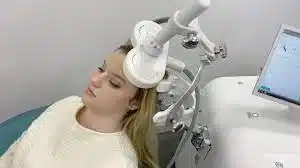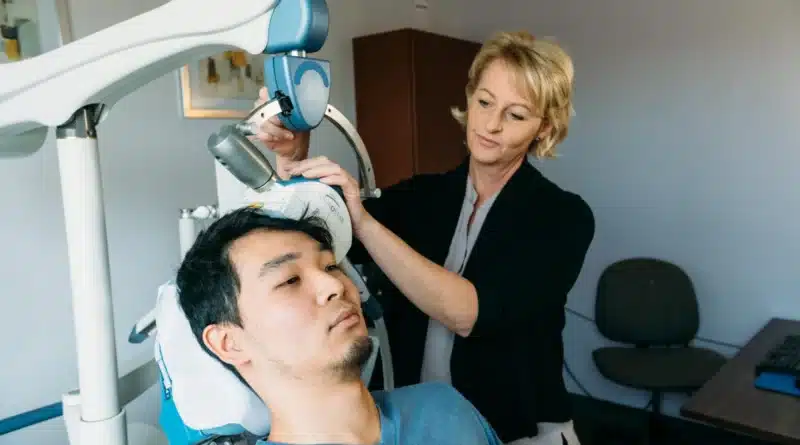What Are the Benefits of TMS Therapy?
TMS Therapy is a form of neurofeedback that can be used to treat a wide variety of conditions, from addiction to depression. The therapy is noninvasive and involves 20-minute sessions where the person receives stimulation while sitting in a chair. The person wearing the helmet-like device is able to drive themselves to and from their session, which is a great benefit. You can learn more about the benefits of TMS therapy by visiting brainsway.com.
Treatment of depression with TMS Therapy
TMS is an FDA-cleared treatment for major depressive disorder, a mental health condition. The treatment is an effective treatment for depressive episodes in adult patients with major depressive disorder who have failed to respond to standard antidepressant medications. Its benefits include a three-minute treatment session and is effective even for those who have not shown any response to conventional treatments. Patients may choose from a wide range of TMS treatments, including traditional, deep, or “theta burst” protocols.
No Systemic Side Effects
The TMS technique was approved by the FDA in 2008 and has since become a valuable treatment for treatment-resistant depression. It is a safe, noninvasive procedure with minimal side effects. The BrainsWay Deep TMS is effective in treating depression in patients with a variety of conditions. Its lack of systemic side effects makes it a popular choice among depression patients. The procedure has no systemic side effects, and there are no reported cases of severe or fatalities. During a trial, the TMS therapy did not affect memory function, nor did it interfere with normal mood and behavior.
Reduction In Depressive Symptoms
The benefits of TMS therapy include increased quality of life and a reduction in depressive symptoms. Using transcranial magnetic stimulation to treat depression is considered a safe, effective, and noninvasive treatment. This treatment is a noninvasive method of treating depression and uses magnetic pulses from a handheld device that targets depression-related brain structures. Traditional rTMS has several limitations, including a limited scope of stimulation. The standard coils cannot reach deep structures in the brain.
Treatment Of Depression With Tms Therapy
Treatment of depression with TMS Therapy has become a viable option for patients with severe depression. BrainsWay’s Deep TMS treatment is FDA-cleared for treating depression, OCD, and short-term smoking cessation. It has recently been expanded to treat Anxious Depression. With Deep TMS, patients will experience significant improvement in their depressive symptoms and have no systemic side effects.
Noninvasive And Is FDA-Approved
Deep TMS therapy is noninvasive and is FDA-approved for the treatment of depression and OCD. This treatment requires only four to six sessions per week, and it is a painless outpatient treatment that works quickly. Brainsway Deep TMS uses patented H-coils to deliver magnetic pulses to deeper regions of the brain. This treatment is suitable for patients with major depression, including those who have previously failed to respond to conventional treatments.

Completely Drug-Free Treatment
The benefits of Deep TMS for depression patients are impressive, and the treatment is completely drug-free. Patients don’t have to undergo surgery, nor are patients required to take a lifetime of medication. Furthermore, because deep TMS is noninvasive, patients do not experience memory loss or systemic side effects. This treatment also eliminates the need for a strict drug regimen. For those who are experiencing severe depression, Brainsway Deep TMS may be the best option for them.
Treatment Of OCD With TMS Therapy
A recent study found that TMS therapy can improve the symptoms of OCD. A randomized, controlled trial of this therapy was conducted in which patients were treated with a protocol consisting of five twenty-minute sessions per week over six weeks. The treatment was tailored to the patients’ symptoms and involved tailored provocation. The Deep TMS treatment is non-invasive and requires no anesthesia. Moreover, this treatment is safe, as it doesn’t involve using electricity.
Neuroanatomical Error Detection
Brainsway’s H7/HAC coil targets the anterior cingulate cortex, which is a region of the brain that is involved in neuroanatomical error detection. Patients with OCD have altered neural activity in this area, and this type of TMS therapy can help them regain control over their behavior. Patients who undergo this therapy can return to normal activities immediately following treatment. Most health insurers and HMOs cover BrainsWay’s Deep TMS therapy. However, coverage is limited. Moreover, the technique has some side effects and is not widely used.
FDA-Cleared Treatment For OCD
TMS is an FDA-cleared treatment for OCD. The technique works by delivering deep magnetic stimulation to the brains’ deeper regions, where the symptoms of OCD are triggered. This type of treatment has many benefits, including eliminating the urge to engage in repetitive behaviors. In fact, brainsway’s OCD Deep TMS technology is the only one FDA-cleared to treat the condition.
Alternative To Pharmacological Treatment
TMS is a less invasive and safer alternative to pharmacological treatment. However, it must be prescribed by a psychiatrist, who has reviewed the patient’s records and is prescribing an evidence-based protocol for treating OCD. Although the physician must oversee the treatment, patients do not need to visit the treatment center personally. Its benefits are still unrivaled. You can enjoy your daily routine while receiving TMS treatment.
Patented H-Coil Technology
Deep TMS uses patented H-Coil technology to safely and effectively transfer repeated pulses of electromagnetic fields to the brain. This method reaches a wide region of the brain simultaneously and directly regulates deeper structures. This technology is FDA-cleared for treating OCD, smoking cessation, and depression. It can even improve symptoms of depression and anxiety. Deep TMS requires daily treatments for six weeks. Continuing the treatments is recommended to help maintain the results.
Risks And Side Effects Of TMS Therapy
Patients should be aware of the risks and side effects of TMS therapy. As with any other treatment, it is important to follow a doctor’s advice. Deep TMS is not appropriate for everyone. Some people may experience aggressive behavior, irritability, or suicidal behaviors. You should consult a physician before you begin treatment with BrainsWay. If the side effects are too severe, you should seek medical attention immediately.
Cognitive-Behavioral Therapy
Cognitive-behavioral therapy can also help with treating the symptoms of OCD. Cognitive-behavioral therapy, for example, helps patients gain better awareness of their symptoms and select better reactions to triggering stimuli. However, the effectiveness of cognitive-behavioral therapy depends on a patient’s motivation and willpower. But the benefits of cognitive-behavioral therapy far outweigh the risks.
Treatment Of Addiction
BrainsWay has revolutionized the field of noninvasive brain treatments. The company’s Deep TMS (Transcranial Magnetic Stimulation) therapy has been cleared by the FDA for use in treating depression, obsessive-compulsive disorder, and smoking addiction. Its patented H-Coil technology activates an electromagnetic field that sends magnetic pulses to the brain, reaching deeper brain structures.
No Cause Of Seizures
The Deep TMS System used by BrainsWay does not cause known seizures, but it does cause twitching, which may not represent focal seizures. Previous studies using the Deep TMS System have reported seizures, but these occurred in subjects on high doses of psychotropic medications or high alcohol intake. These seizures did not result in any long-term physical sequelae. However, the results were encouraging and support the benefits of using the TMS system to treat addiction.
Patients With Nicotine Addiction
The Deep TMS System’s Patient Manual is a supplement to the instructions for use for patients with nicotine addiction. It is designed to help people stop smoking, and is effective for short-term smoking cessation. While this treatment may not be the best option for long-term smoking cessation, it has been clinically proven to be effective for quitting the habit. Furthermore, patients in the Deep TMS treatment arm reported fewer cigarettes smoked at their target quit date.
A Breakthrough In Addiction Treatment
The Deep TMS technology used by BrainsWay is considered a breakthrough in addiction treatment. This advanced therapy reaches significant depths in the brain and can provide symptom relief in patients who have struggled with addiction for a long time. Deep TMS is also effective for treating depression in patients who have been resistant to other treatments. The Deep TMS program requires eligibility for treatment and is covered by most insurance providers.
No Adverse Effects
The BrainsWay Deep TMS treatment has many benefits over antidepressants. Most users report no adverse effects during treatment. Some users experience muscle twitching or jaw pain, which is temporary. However, it should be noted that the benefits outweigh the risks. The brainsway Deep TMS device can cause significant changes in a patient’s behavior. It may also cause euphoria. However, the most significant benefit of this treatment is that it does not have many negative side effects.
Magnetic Fields To Regulate Brain Structures
Transcranial magnetic stimulation (TMS) is a noninvasive therapy that uses magnetic fields to regulate brain structures. Although the brain is not fully understood, neuroscientists have made great strides in understanding the brain. BrainsWay’s technology is unique in that it combines known brain regions with treatment for addiction. This technology is known as Deep TMS, and it is a breakthrough in the field of addiction treatment.
Conclusion
Deep TMS treatment is convenient and well-tolerated. A patient can easily find a nearby clinic and get started on the therapy process. Deep TMS therapy involves a comfortable chair and helmet. The patient will feel a slight tapping or knocking sound. The stimulation will take about an hour, so the treatment session should last less than one hour. The brainsway com team will provide you with a list of locations near your location.

